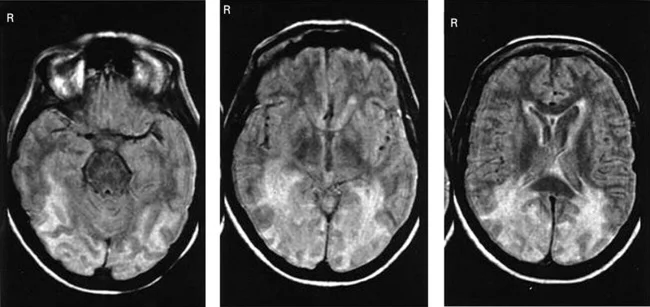The phrase “All our problems are in our heads” can be applied to many things. Sometimes you can drive yourself crazy, or even deny reality. There are a number of syndromes in which our minds play tricks on us—whether they are caused by culture, prejudice, the effects of illness, or something else entirely. Let's take a look at ten of these unusual syndromes. 
1. Gourmet syndrome 
After injuries to the frontal lobe of the brain, foodie syndrome, a rare eating disorder, can occur. This is not just enjoying delicious food - but also talking, reading countless materials on this topic, and preoccupation with delicious dishes. Most patients with this disease had lesions in the same area of the brain. The disorder was discovered in the 1990s. One political reporter who once struggled with foodie syndrome switched careers to become a food writer.
2. California Daughter Syndrome 
This is a phenomenon that has been repeatedly observed by healthcare professionals when interacting with elderly or terminal patients. When the patient is already close to death, his relative suddenly appears, who had never visited him, but knew that he was terminally ill. This relative with “California daughter syndrome” behaves aggressively, insists that doctors take urgent measures to prolong the patient’s life, and even challenges the prescribed treatment. There is a psychological explanation for this. Such people resort to such drastic measures because they feel guilty and deny their involvement in the relative’s condition.
3. Third Man Syndrome 
Third person syndrome is when people feel the presence of someone unknown next to them - for example, a guardian angel or another guide. Numerous evidence indicates that people experience the presence of a “third” in life-threatening situations. Ernest Shackleford was one of the first to write about this phenomenon while exploring Antarctica in the early 1900s. In his notebooks, he described that at some point it seemed to him that in addition to his partners, another entity was walking next to them. Since then, other people who have faced difficult situations have described similar things, including climbers, explorers and shipwreck survivors. Another example is Frank Smith, who attempted to climb Everest in 1933 and met a mysterious companion who helped him overcome his loneliness and encouraged him along the way.
4. Anton-Babinski syndrome 
Anton-Babinski syndrome occurs when a person denies their blindness. Refusing to accept reality and their illness, such people make up stories and convince others that they see objects or people in the room that are not actually there. For example, one patient with this syndrome insisted on being transferred to another ward - it seemed to her that every ward she was in was too gloomy.
5. Stendhal syndrome 
Some people take art very seriously because of their work. And there are people with Stendhal syndrome - they react extremely emotionally to works of art, they can cry, and seem to be transported into the reality depicted on the canvas. This condition can cause dizziness, rapid heartbeat, hallucinations, and panic attacks when viewing paintings or other art.
6. Capgras syndrome 
A typical symptom of this syndrome: the patient believes that someone close or loved to him has been replaced. This can also extend to pets or other significant objects. The disorder may more often be the result of neurodegenerative diseases or traumatic brain injury.
7. Kandinsky-Clerambault syndrome 
Kandinsky-Clerambault syndrome is a disorder that also falls under the general concept of “erotomania.” A person suffering from the syndrome is sure that the object of his passion has reciprocal feelings for him, and sees non-existent signs that the object of love gives him. The condition may be short-term or have long-term consequences. Most often, this diagnosis is given to women: but there is an opinion that the disorder has not been sufficiently studied in men.
8. Salieri syndrome 
Italian composer Antonio Salieri is known for his rivalry with Mozart. Salieri was jealous of him professionally, and it is believed that he could have poisoned him. This phenomenon is called "Salieri syndrome". It is characterized by discrediting someone else's success and pathological aggression towards the object of envy. The syndrome has been studied in group settings, where feelings of envy and aggression have been shown to weaken the group as a whole and reduce individual performance.
9. Chinese restaurant syndrome 
Chinese restaurant syndrome is a set of symptoms allegedly experienced after eating food from Chinese restaurants. It is believed to be caused by the widespread use of MSG in dishes, but has not yet been scientifically proven. Symptoms include weakness, sweating, nausea and headaches that occur after eating food. This syndrome came to light in the 1960s and 1980s, when Chinese restaurants were gaining popularity in the West. However, it is now believed that a significant part of the symptoms and the “demonization” of MSG are just prejudices.
10. Puppy pregnancy syndrome 
Puppy pregnancy syndrome is a strange phenomenon that is common in villages of several states in India, and despite its absurdity, it has been studied many times. Sufferers of the syndrome claimed that after being bitten by a dog they became pregnant with puppies. The first to come forward were six men and one woman, all from rural areas near Calcutta. However, a small percentage of those who reported their illness had a history of mental health problems. In addition, the vast majority of residents of those villages believe that this phenomenon is absolutely real - they are sure that dog saliva can promote conception, especially if the dog bites a person in a state of strong excitement. To treat the disease, local healers used spells that allegedly “brought” puppies out of the patient’s body.
0 comments
